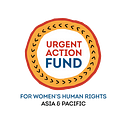A new decade of resistance
Its a new year and a new decade! We stride into 2020 as a two-year old niche grant-making regional fund working across Asia and the Pacific with women and non-binary human rights activists. Over the last two years, we have provided grants amounting to US$350,000 to activists and networks across countries of Asia and the Pacific. These grants have come at a time of reckoning for several activists and organisations.
There is a massive humanitarian crisis across both these regions which transcend borders and cultural differences. Authoritarianism across several countries we work in has resulted in innumerable human rights violations; such as the Rohingya crisis, the Papua violence or citizenship bill protests in India. The battle of perceptions is being ruthlessly manipulated by state control and dissent clamped down. At UAF A&P, we are working to complement our core work of disbursing rapid response grants with programmes to co-create models of safety and care with defenders to build their resilience n such times.
The mountains we climbed together in 2019: In 2018, we focused on institution and programme building — we set processes and frameworks in place to navigate multiple complexities of regional realities we confront: a co-leadership model that reports to not one but three boards (a regional UAF A&P board and two country boards in Australia and the Philippines); virtual working spaces for the team based in different countries, and most challenging of them all, a non-traditional monitoring, evaluation, accountability and learning (MEAL) framework based on emergent learning.
We are exploring our theory of change through answers to two key questions: What will it take to practice a feminist culture of sharing and caring in the organisation?; and What will it take to strengthen the resilience of women and non-binary HRDs? And as we tried to adapt our individual programme learnings to answer organisational learning questions, we began appreciating the adage ‘It takes a Village’. In 2019, we completed a cycle of experimenting with emergent learning as a MEAL framework. We now have a framework that our team has been socialised to use to track their programme progress. And we continue the cycle of implementing, learning and adjusting our programmes to better answer our learning questions.
The highlights: Our grant-making, which is the core of our operations, offered 53 grants in 2019, of which over 50% were to women or non-binary activists from marginalised groups. This was a big challenge identified for 2019, and achieving that goal is a step forward in our mission to ensure safer and resilient communities of Asian and Pacific defenders. We also completed setting up our secure grant application portal. Developing a grants database of our own was a conscious decision to ensure that our grantee information remains confidential and secured. We launched it on 29 November on International Women Human Rights Defenders’ Day as a show of solidarity with all the women and non-binary human rights defenders staking their lives and livelihoods for the greater good.
We are committed to placing grantee security and confidentiality at the forefront of all our activities. We continue to demonstrate this by encouraging our entire ecosystem — from the Board to Advisors to grantees and partner networks — to seek more secure platforms for communication and engagement. This behavioral change will take a few more years to be normalised among our peer donor networks, but the seeds of change have been planted!
Compared to Safety and Well Being Grants, we have received fewer applications for Resourcing Resilience Grants. On reflection, we realised that activists or networks are unable to assess and enunciate their needs. Since many women and non-binary human rights defenders work frequently in a crisis mode, they often focus solely on countering immediate threats, without sparing time or resources towards developing a systems approach to resilience building. It also proved to be the main hurdle while we piloted our Webs of Safety and Care programme. However, our engaged approach with networks in the Philippines is coming to fruition. Our first grant to model a webs of safety and care among activists facing grave risk will be offered in early 2020!
In the Pacific, we have been instrumental in undertaking critical research to explore the scope and kind of funding available to women’s rights activism. A key recommendation that emerged is a need for a Pacific Women’s Fund that empowers community organisations to participate in priority-setting with funders. We presented these findings at a groundbreaking convergence of women’s funds from Asia and the Pacific in Bangkok in September 2019. It was a shared safe space where women’s rights activists, community organisations, women’s funds in the regions and big bilateral donors co-strategised to set funding priorities for revolutionising philanthropy.
How is 2020 looking? We will be at several convenings of regional and global import, including the Australasian Aid Conference and in New York in March to release our scoping report ‘Where’s the Money for Women and Girls in the Pacific’? At an organisational level, 2020 will be the culmination of our 3-year inception phase. As a lead up to our strategy meeting later this year, we will undertake a collective reflection of our programmes and processes. Our strategy setting for the next three years will be an opportunity to explore how to effectively engage with a wider ecosystems, which extends beyond our team and advisors and encompasses our grantees and peer networks. In synergy with all these actors, we aim to set strategic paths for resilience building of activists and their movements.
